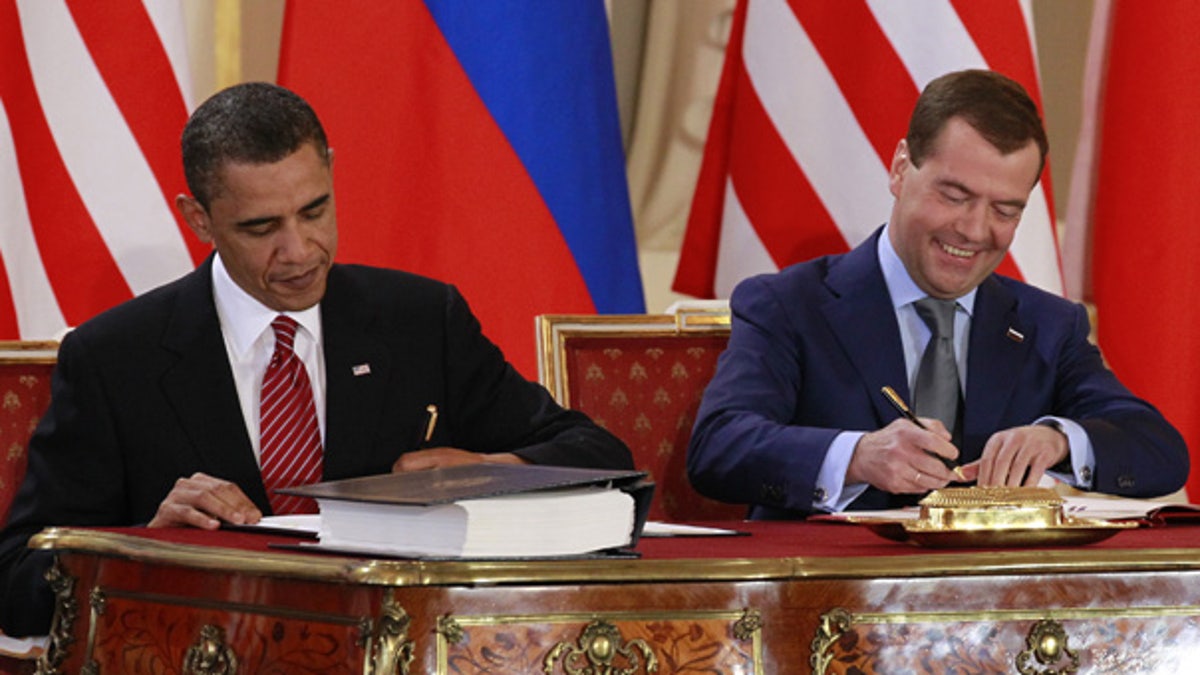
FILE: In this April 8, 2010, photo, President Obama signs the New START treaty with Russian President Dmitry Medvedev at the Prague Castle. (AP)
Russia's announcement that it will help Iran get nuclear fuel is raising questions about what President Obama calls the "better-than- ever" relationship between Russia and the U.S. after the two former Cold War adversaries recently signed a nuclear reduction treaty.
Obama also recently declared his Russian counterpart, Dmitri Medvedev, would help the U.S. "secure strong, tough sanctions on Iran."
But Moscow announced Friday it will start loading fuel into Iran's first and only nuclear power plant next Saturday, giving Tehran a boost as it struggles with international sanctions and highlighting differences between Moscow and Washington over pressuring the Islamic Republic to give up activities that could be used to make nuclear arms.
Uranium fuel shipped by Russia will be loaded into the Bushehr reactor on August 21, beginning a process that will last about a month and end with the reactor sending electricity to Iranian cities, Russian and Iranian officials said Friday.
While the UN nuclear watchdog and U.S. officials say the Bushehr reactor is not a proliferation risk, Russia's decision to supply the fuel calls into question why Iran is enriching uranium in the first place.
"It quite clearly I think underscores that Iran does not need its own enrichment capability if its intentions as it states are for a peaceful program," White House spokesman Robert Gibbs said.
If Russia carries out its plan, it will end years of foot-dragging on Bushehr. While Moscow signed a $1 billion contract to build the plant in 1995, its completion has been put off for years.
Moscow has cited technical reasons for the delays. But Bushehr has also been an ideal way to gain leverage with both Tehran and Washington.
Delaying the project has given Russia continued influence with Tehran in international attempts to have it stop uranium enrichment -- a program Iran says it needs to make fuel for an envisaged reactor network but which also can be used to create fissile warhead material. The delays also have served to placate the U.S., which opposes rewarding Iran while it continues to defy the U.N. Security Council with its nuclear activities.
After Russia said in March that Bushehr would be launched this year, U.S. Secretary of State Hillary Rodham Clinton said that until Iran reassures the world it is not trying to build a nuclear weapon, "it would be premature to go ahead with any project at this time."
Formally, the U.S. has no problem with Bushehr.
Although at first opposed to Russian participation in the project, Washington and its allies agreed to remove any reference to it in the first set of Security Council sanctions passed in 2006 in exchange for Moscow's support for those penalties. Three subsequent sanctions resolutions also have no mention of Bushehr.
Still, the U.S. sees the Russian move as a false signal to Tehran as Washington strives to isolate Iran politically and economically to force it to compromise on enrichment.
In Washington, State Department spokesman P.J. Crowley said Bushehr "does not represent a proliferation risk. ... However, Bushehr underscores that Iran does not need its own indigenous enrichment capability. The fact that Russia is providing fuel is the very model the international community has offered Iran."
Russia, in turn, argues that the Bushehr project is essential for persuading Iran to cooperate with the U.N. nuclear watchdog and fulfill its obligations under international nuclear nonproliferation agreements.
Crowley added: "Our views on the Bushehr project should not be confused with the world's fundamental concerns with Iran's overall nuclear intentions, particularly its pursuit of uranium enrichment, and Iran's willful violation of its international obligations."
Russian officials did not say why they had decided to move ahead with loading fuel into the Bushehr plant now. But the move could have been triggered in part by Moscow's desire show the Iranians it can act independently from Washington after its decision to support the fourth set of U.N. sanctions in June and its continued refusal to ship surface-to-air missile systems that it agreed to provide under a 2007 contract to sell the S-300s.
The sophisticated S-300 anti-aircraft missiles would significantly boost Iran's ability to defend against airstrikes. Israel and the United States have strongly objected to the deal.
Russia has walked a fine line on Iran for years. One of six world powers leading international efforts to ensure Iran does not develop a nuclear weapon, it has strongly criticized the U.S. and the European Union for following up with separate sanctions after the latest U.N. penalties -- which Moscow supported -- were passed.
"We expect Iran to meet established international norms and practices to ensure the safe operation of the reactor under full safeguards monitoring" by the IAEA, Crowley said.
The Associated Press contributed to this report.




